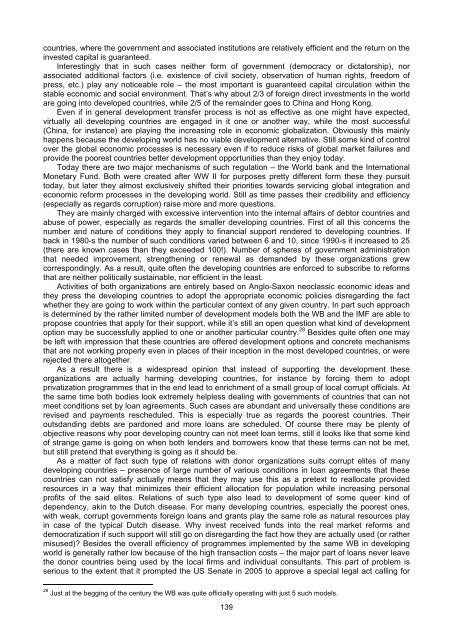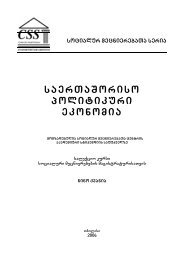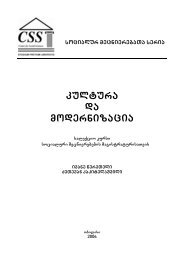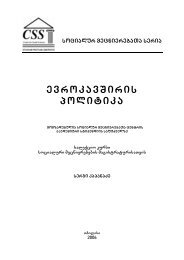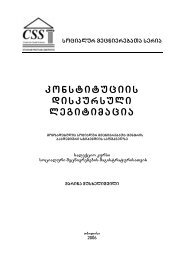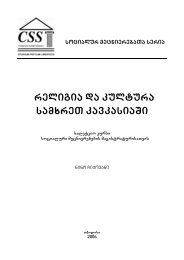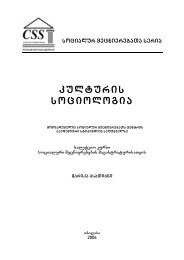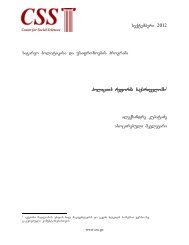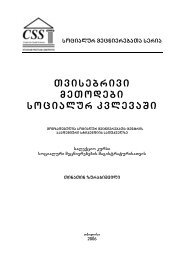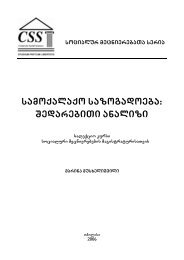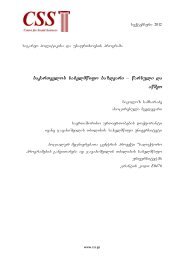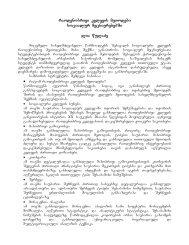social systems too.Maximum what can be done in the process of economic globalization is to achieve increase ofaverage income level, both worldwide as well as inside any individual country. In the end this will leadto social and economic stability, minimize poverty.Factually this means development of the large, powerful layer of the middle income countries, whilethe poorest will constitute the small minority with the average level of life considerably higher, thantoday. 27Fact that development transfer does not work very well in case of majority of the developingcountries, may be ascribed to the following two factors –1. Developing world is doing just enough to fulfill the tasks mentioned above, which is obviouslynot enough to ensure serious, successful economic trans<strong>for</strong>mation in developing countries.2. The model of development transfer adopted today as it is can not ensure success of theprocess – either the model itself is faulty, or developing countries <strong>for</strong> various reasons are notable to adopt it to their local settings.At least at the initial stage of the global economic trans<strong>for</strong>mation indices of economic growth <strong>for</strong> themajority of developing countries looked rather impressive. Both rival political blocks were engaged inpumping up economies of their client countries through huge amounts of financial, material,technological and logistical support and such approach worked <strong>for</strong> a while disregarding which model ofdevelopment (market or centrally controlled economy) these countries <strong>for</strong>mally adopted. Trouble,precipitated by oil crises of 1970-s started when developing countries in general exhausted potential <strong>for</strong>extensive growth and faced need <strong>for</strong> deep structural re<strong>for</strong>ms and institutional trans<strong>for</strong>mations.By this time the Soviet Union was to a large extent out of the race since its economy neededre<strong>for</strong>ms itself, which ailing socialist system was not able to carry out. Thus almost unilaterallydeveloping countries found themselves within the confines of the Western type neo-liberal economicdevelopment model. Policy of structural adjustment suggested by this model called <strong>for</strong> carrying outmarket oriented strategies based on sharp reduction of the state involvement into economy andopening up <strong>for</strong> the Western investments. Economic policies had to be export oriented in order to payaccumulated debts. Besides it requested strict economy of government finances, which in majority ofcases led to folding of already weak social programs. These measures were augmented by floatingbank interest rates, which caused a dramatic increase of <strong>for</strong>eign debts of these countries, sharp drop ofprices of raw materials (leading export commodities <strong>for</strong> developing countries), and deteriorating tradeconditions when developed countries were applying protectionist trade barriers but denied thedeveloping ones the right to follow their example. Economies of majority of developing countries couldnot withstand such pressure and entered 1990-s with much worse per<strong>for</strong>mance indicators, than at thebeginning of 1970-s <strong>for</strong> instance.Besides even when any given country carries out structural adjustment by the book and to the endthis does not guarantee its eventual success. Such country simply starts to play by rules accepted bythe more developing countries with all the pending consequences, like <strong>for</strong> instance cyclic economiccrises with accompanying recessions and financial shocks. Whether such country is carrying outsuccessful and correct market policy does not matter much – it runs into the classic case of “marketfailure”, which manifests itself in a rather asymmetric way. Developing countries are relatively weaknewcomers in a highly competitive global market and suffer much more in case of crises than the moretraditional and more powerful players. In case of crisis they can not even apply problem solving toolsused by the more developed economies and <strong>for</strong> instance have to address strict fiscal and monetarypolicies in order to restore “market trust” instead of stimulating macroeconomic measures.Even when developing markets are functioning properly, the less developed and weaker are stillpunished. As it is the market does not create the equal opportunities. It obviously favours countrieswhich already possess productive capital – finances, land, other physical assets and the most importantin the current technology based economy – the human capital. Countries, which are already well aheadof the others possessing stable political systems, guaranteed private property rights, reliable bankingsystems, developed social services – are also enjoying much higher chances to employ theopportunities provided by the single global market. Countries, which do not have such capital oftenfound themselves inside so called “institutional poverty trap”, although these are the vast majority ofdeveloping countries (including many of the <strong>for</strong>mer Soviet republics). One of evidences of existence ofsuch “trap” is that the global capital is usually attracted to places where it is already abundant i.e. to27 I.e. the difference between the current and future poor should be approximately as it is today between the Americansand Africans <strong>for</strong>mally living in poverty.138
countries, where the government and associated institutions are relatively efficient and the return on theinvested capital is guaranteed.Interestingly that in such cases neither <strong>for</strong>m of government (democracy or dictatorship), norassociated additional factors (i.e. existence of civil society, observation of human rights, freedom ofpress, etc.) play any noticeable role – the most important is guaranteed capital circulation within thestable economic and social environment. That’s why about 2/3 of <strong>for</strong>eign direct investments in the worldare going into developed countries, while 2/5 of the remainder goes to China and Hong Kong.Even if in general development transfer process is not as effective as one might have expected,virtually all developing countries are engaged in it one or another way, while the most successful(China, <strong>for</strong> instance) are playing the increasing role in economic globalization. Obviously this mainlyhappens because the developing world has no viable development alternative. Still some kind of controlover the global economic processes is necessary even if to reduce risks of global market failures andprovide the poorest countries better development opportunities than they enjoy today.Today there are two major mechanisms of such regulation – the World bank and the InternationalMonetary Fund. Both were created after WW II <strong>for</strong> purposes pretty different <strong>for</strong>m these they pursuittoday, but later they almost exclusively shifted their priorities towards servicing global integration andeconomic re<strong>for</strong>m processes in the developing world. Still as time passes their credibility and efficiency(especially as regards corruption) raise more and more questions.They are mainly charged with excessive intervention into the internal affairs of debtor countries andabuse of power, especially as regards the smaller developing countries. First of all this concerns thenumber and nature of conditions they apply to financial support rendered to developing countries. Ifback in 1980-s the number of such conditions varied between 6 and 10, since 1990-s it increased to 25(there are known cases than they exceeded 100!). Number of spheres of government administrationthat needed improvement, strengthening or renewal as demanded by these organizations grewcorrespondingly. As a result, quite often the developing countries are en<strong>for</strong>ced to subscribe to re<strong>for</strong>msthat are neither politically sustainable, nor efficient in the least.Activities of both organizations are entirely based on Anglo-Saxon neoclassic economic ideas andthey press the developing countries to adopt the appropriate economic policies disregarding the factwhether they are going to work within the particular context of any given country. In part such approachis determined by the rather limited number of development models both the WB and the IMF are able topropose countries that apply <strong>for</strong> their support, while it’s still an open question what kind of developmentoption may be successfully applied to one or another particular country. 28 Besides quite often one maybe left with impression that these countries are offered development options and concrete mechanismsthat are not working properly even in places of their inception in the most developed countries, or wererejected there altogether.As a result there is a widespread opinion that instead of supporting the development theseorganizations are actually harming developing countries, <strong>for</strong> instance by <strong>for</strong>cing them to adoptprivatization programmes that in the end lead to enrichment of a small group of local corrupt officials. Atthe same time both bodies look extremely helpless dealing with governments of countries that can notmeet conditions set by loan agreements. Such cases are abundant and universally these conditions arerevised and payments rescheduled. This is especially true as regards the poorest countries. Theiroutsdanding debts are pardoned and more loans are scheduled. Of course there may be plenty ofobjective reasons why poor developing country can not meet loan terms, still it looks like that some kindof strange game is going on when both lenders and borrowers know that these terms can not be met,but still pretend that everything is going as it should be.As a matter of fact such type of relations with donor organizations suits corrupt elites of manydeveloping countries – presence of large number of various conditions in loan agreements that thesecountries can not satisfy actually means that they may use this as a pretext to reallocate providedresources in a way that minimizes their efficient allocation <strong>for</strong> population while increasing personalprofits of the said elites. Relations of such type also lead to development of some queer kind ofdependency, akin to the Dutch disease. For many developing countries, especially the poorest ones,with weak, corrupt governments <strong>for</strong>eign loans and grants play the same role as natural resources playin case of the typical Dutch disease. Why invest received funds into the real market re<strong>for</strong>ms anddemocratization if such support will still go on disregarding the fact how they are actually used (or rathermisused)? Besides the overall efficiency of programmes implemented by the same WB in developingworld is generally rather low because of the high transaction costs – the major part of loans never leavethe donor countries being used by the local firms and individual consultants. This part of problem isserious to the extent that it prompted the US Senate in 2005 to approve a special legal act calling <strong>for</strong>28 Just at the begging of the century the WB was quite officially operating with just 5 such models.139
- Page 1 and 2:
socialur mecnierebaTa seriamsofliop
- Page 3:
s a r C e v iSesavali .............
- Page 6 and 7:
situaciis arseboba, Tavis mxriv, am
- Page 8 and 9:
globalizacia — ori antagonisturi
- Page 10:
(informacia), vidre ramdenime aTeul
- Page 13 and 14:
TanamSromlobas. faqtiurad SesaZlebe
- Page 15 and 16:
1.3. msoflio politikis Teoriebi1.3.
- Page 17 and 18:
TanamSromlobaze uaris Tqma sul ufro
- Page 19 and 20:
danarCeni msofliosagan gansxvavebiT
- Page 21 and 22:
meqanizmebi ubralod ar arsebobs;•
- Page 23 and 24:
idga zemoT daxasiaTebul “piramidu
- Page 25 and 26:
amocanebis gadasaWrelad. 37es ar ni
- Page 27 and 28:
dacema, pirvel rigSi, materialuri d
- Page 29 and 30:
ealurad globaluri iyo. isini, isevd
- Page 31 and 32:
mSeneblobis procesSi klasobrivi brZ
- Page 33 and 34:
dolaris daxmareba miiRo.sainteresoa
- Page 35 and 36:
sistemas da gamoiwvia britaneTis im
- Page 37 and 38:
miekuTvneboda (ix. danarTi 3.1 da 3
- Page 39 and 40:
TiTqmis mTlianad ugulvebelyos is pr
- Page 41 and 42:
2.2.5. meore globalizaciis dros gag
- Page 43 and 44:
gakeTeba (iaponia). meore mxriv, er
- Page 45 and 46:
ac saboloo jamSi qmnis sistemis des
- Page 47 and 48:
laparakia imaze, rom romelime calke
- Page 49 and 50:
mmarTvelobis principebis adaptacia
- Page 51 and 52:
matareblebi arian. ukve es faqti aq
- Page 53 and 54:
warmoadgens nebismieri warmatebuli
- Page 55 and 56:
koloradosa da vaiomingis nawilebi.
- Page 57 and 58:
xSirad faqtiurad kulturuli misioner
- Page 59 and 60:
dasawyisSi oficialurad TviT aSS-ma
- Page 61 and 62:
mosaxleobis 20%, romelic yvelaze md
- Page 63 and 64:
sruli liberalizaciis Sesaxeb faqtiu
- Page 65 and 66:
gansxvavebebi, ganpirobebuli maTi e
- Page 67 and 68:
urTierTobaSi.3.4. zemoT aRwerili pr
- Page 69 and 70:
evri qveynisaTvis zemoT aRwerili ti
- Page 71 and 72:
aSS saerTaSoriso daxmarebis naxevar
- Page 73 and 74:
aSkarad sWarbobs evrogerTianebis ne
- Page 79 and 80:
meore — Tanamedrove sabrZolo saSu
- Page 81 and 82:
SeuZliaT, an ar awyobT efeqturi Ron
- Page 83 and 84:
amoiwura.cnobili ebraeli moRvawe,
- Page 85 and 86:
masze agebuli civilizaciis sistemur
- Page 87 and 88: eJimi mravali wlis manZilze xels uw
- Page 89 and 90: mxolod SedarebiT mcire nawils Seexo
- Page 91 and 92: daavadebebiT. am konfliqtSi monawil
- Page 93 and 94: naxevar saukunes moiTvlis. principS
- Page 95 and 96: kontrols eqvemdebareba.rac Seexeba
- Page 97 and 98: • faqtiurad nebismieri gadawyveti
- Page 99 and 100: 4.2.3. globalur doneze aseTi tipis
- Page 101 and 102: krizisebisagan, rom rodesac bazari
- Page 103 and 104: sabWoTa kavSirma gamomdinare nawilo
- Page 105 and 106: usafrTxoebis erT-erTi ZiriTadi elem
- Page 107 and 108: Microsoft-is top-menejerebs). sadac
- Page 109 and 110: veb-gverdebs; xolo Google-m 2006 we
- Page 111 and 112: saxiT, amerikis moqmedeba SedarebiT
- Page 113 and 114: organizaciebis da a.S.amave dros, r
- Page 115 and 116: 2 termini globaluri mainc uamravi s
- Page 117 and 118: 61 ssrk-s SemTxvevaSi etyoba misi g
- Page 119 and 120: 30-jer naklebia, vidre saavtomobilo
- Page 121 and 122: SesaZlebelia faqtiurad nebismieri s
- Page 123 and 124: however powerful, can become transn
- Page 125 and 126: 2. Does not matter in what sphere o
- Page 127 and 128: system, which leads to restoration
- Page 129 and 130: On the other hand, in the late 19 t
- Page 131 and 132: traceable here, technological compo
- Page 133 and 134: extremist than terrorists themselve
- Page 135 and 136: human rights is routine. 24The situ
- Page 137: Transformation of Islam, as the rel
- Page 141 and 142: Of course if the developed world ma
- Page 143 and 144: (including affiliated agencies and
- Page 145 and 146: including legal acts, represents re
- Page 147 and 148: passed by its more successful prede
- Page 149 and 150: principle should possess some cultu
- Page 151 and 152: coherent and purposeful than before


